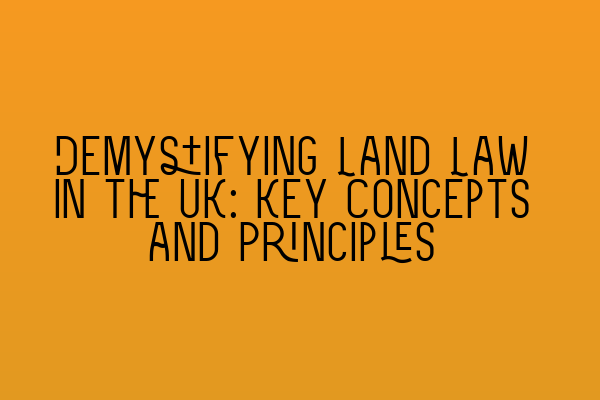Welcome to the SQE Property Law & Land Law blog! In today’s post, we will demystify the key concepts and principles of land law in the UK. Land law can often seem complex and confusing, but we’re here to break it down for you in a way that is easy to understand.
The Basics of Land Law
Before we dive into the nitty-gritty details, let’s start with the basics. Land law is the area of law that deals with the rights and interests in land. It governs the ownership, use, and transfer of land, as well as any disputes that may arise.
There are various types of rights and interests that can exist in relation to land, including freehold, leasehold, and easements. Understanding these concepts is essential for navigating the complexities of land law.
Freehold refers to absolute ownership of land. When you own a freehold property, you have the right to use and occupy the land indefinitely. This is the highest form of ownership and gives you the most control over the property.
Leasehold, on the other hand, is a temporary right to occupy and use a property. As a leaseholder, you have a lease or tenancy agreement with the freeholder, which sets out the terms and duration of your occupation.
Easements are another important concept in land law. An easement is a right enjoyed by one landowner over another’s land. Examples of easements include rights of way, rights to light, and rights to access essential services.
Land Registration
In the UK, land registration plays a crucial role in land law. The Land Registry is responsible for maintaining registers of ownership and interests in land. The registration process provides certainty and security for landowners and prospective buyers.
When you purchase a property, it is important to ensure that it is properly registered with the Land Registry. This will protect your rights as an owner and prevent any potential disputes in the future.
Land registration also helps to simplify the process of transferring ownership. By registering the transfer of land, the new owner’s rights are recognized and protected.
Co-ownership
In some cases, land may be owned by more than one person. This is known as co-ownership. Co-ownership can be either joint tenancy or tenancy in common.
Joint tenancy means that the co-owners have an equal and undivided share in the entire property. If one co-owner passes away, their share automatically passes to the surviving owner(s). This is known as the right of survivorship.
Tenancy in common, on the other hand, allows co-owners to hold distinct shares in the property. Each co-owner can sell or pass on their share separately, and there is no right of survivorship.
Landlord and Tenant Law
Another important aspect of land law is landlord and tenant law. This area of law governs the relationship between landlords and tenants, including the rights and obligations of both parties.
From lease agreements and rent payments to repairs and evictions, landlord and tenant law covers a wide range of issues. It is essential for both landlords and tenants to be aware of their rights and responsibilities to avoid any disputes or legal issues.
If you are a landlord or a tenant, it is advisable to seek legal advice to ensure that your rights are protected and that you are complying with all relevant laws and regulations.
The Importance of Seeking Legal Advice
Land law in the UK can be complex, and it is always advisable to seek legal advice when dealing with any land-related matters. A solicitor with expertise in property law can guide you through the complexities of land law, protect your rights, and help you navigate any disputes that may arise.
At SQE Property Law & Land Law, we offer comprehensive legal services for all your property law needs. Our team of expert solicitors are well-versed in all aspects of land law and can provide you with the guidance and support you need.
If you’re preparing for the SQE exams and need additional resources and practice materials, check out our related articles:
- SQE 1 Practice Exam Questions
- SQE 1 Practice Mocks FLK1 FLK2
- SQE 2 Preparation Courses
- SQE 1 Preparation Courses
- SRA SQE Exam Dates
We hope this blog post has helped demystify land law in the UK. If you have any further questions or need legal assistance, don’t hesitate to contact us. Our team is always ready to provide you with expert advice and support.
